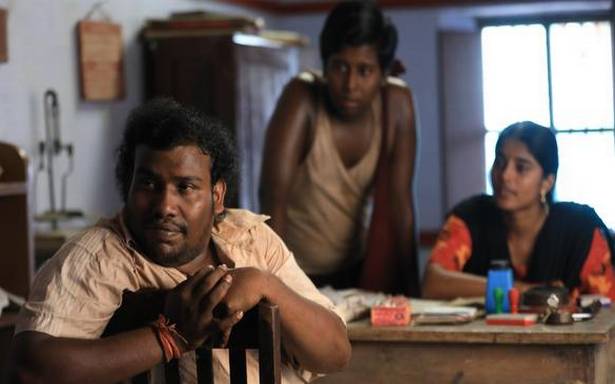Composer Bharath Sankar breaks down the individual songs in his recently-released debut album, ‘Mandela’, and discusses its African connection
In 2019, Bharath Sankar was on a tour to Madagascar, off East Africa, when he became acquainted with a family of musicians. They performed to Tamil songs and Bharath returned the favour by performing to their songs, markedly signalling a collaboration. He somehow wanted to loop them in but had difficulties contacting them, for it would take a while for his message to reach.
Bharath says he created a library of soundtracks imagining himself sitting in and sent across a track to Tsanta Randri, the only person who spoke English in the family. The brief given to Tsanta was ‘forgetting the past’ and ‘living in the moment’, and he was asked to write the lyrics, which eventually became ‘Iaino — To Live’, one of the songs in Mandela, directed by another débutante, Madonne Ashwin. Tsanta’s father Mamiliva Randriamihajasoa, also a musician, wrote the lyrics in Malagasy and the Tamil translation was written by singer-composer Pradeep Kumar, who is also part of the band Oorka, in which Bharath Sankar is the lead vocalist.
Although the songs for Mandela were composed in 2018, Bharath began researching about African music and was looking at their catalogue of labels composed by popular tribal artists of that region. Since the film also had an African connection, courtesy Nelson Mandela, Bharath felt it needed a rooted music that had the “local flavour but shouldn’t sound too produced and polished”.
Bharath Sankar | Photo Credit: Special Arrangement
As part of the research, Bharath says the soundtrack for films such as The Boy Who Harnessed the Wind and Guava Island helped them to a large extent. ‘Ela Mandela’ was the starting point that signalled he was on the right track. For this, Bharath brought in another African singer, Musa Mashiane, for chorus. Musa had remote knowledge of the existence of Tamil cinema or what the film was about.
Yet, he gave his own interpretation to the song. “Even I had no idea what he was going to bring to the table. He deleted all the bits I had marked for him and sung only for the beginning. Later, when I asked him what it meant, he said he was singing in praise of [Nelson] Mandela,” says Bharath over phone, “It was a good amalgamation of a Tamil song with an African flavour.”
Bharath was disappointed that he could not jam with Musa virtually, but credits him for ‘Mandela Tribute’, which was not part of the album initially but was added at the last minute, as his homage to the African leader. “I sent it to [Madonne] Ashwin and he didn’t say anything. But later, he called to say that he was going to use it.”
The sounds of Mandela
Bharath met the director through a mutual friend and says he was given a bound script and a narration. Bharath could not access the script musically, but says he began to play the harmonium when there was a power shut down and the music flowed. Both Bharath and Ashwin had certain references they agreed upon — but there was no calculated effort. “All songs happened organically and we didn’t narrow on anything. We liked revisiting our work, which gave us time to look objectively and make changes,” says Bharath, quoting the example of ‘Ela Mandela’, which had a different opening music but was changed by adding a mouth percussion.
Mandela has six songs, three of which is written by Arivu who has sung ‘Yela Yelo’, a song whose base was inspired by a certain kind of song fishermen would sing before going to the sea. For ‘Mic Testing’, Bharath wanted the rhythm to sound like a band performance. “I sampled the sounds from YouTube videos and wrote my own version. I wanted it to have a themmangu pattu [folk song] feel,” he says.
A still from ‘Mandela’ | Photo Credit: Special Arrangement
Bharath admits that his influences lay in the compositions he grew up listening and the artists he adored. Watch closely and you will notice him playing a hat-tip to them — from Ilaiyaaraja, Deva to villupattu exponent Subbu Arumugam and Gangai Amaren. This makes sense when he says he wanted to replicate the tabla and dholak beats of ‘Oru Needhi Onbadhu Saadhi’, which itself is a spin on villupattu, from ‘Sandhu Pottu’ (Thevar Magan) and ‘Salomia’ (Kannethirey Thondrinal).
“I have been inspired a lot by Deva. When I was in the North for a concert, we stayed at the artists’ camp where you will have people from all over the world. Invariably, we will be the only tent that wakes up to a loud ‘Vitha Vithama Soap Seepu Kannadi’ song [from Deva],” he says with a laugh, “When you hear those dholak beats, it produces a different effect. Which is why I recorded ‘Oru Needhi…’ live with all artists together.”
Starting out as an independent musician, Bharath had composed for three songs in last year’s Dharala Prabhu, though Mandela marks his debut film album. About the growing space for indie collaborations, Bharath says, “It has not yet become a trend, but filmmakers are no longer looking at the X and Y combinations. Because, they are also an audience and if they discover an artist and become their fan, they try reaching out. Things are changing especially with young filmmakers coming in.”
He adds laughing, “Maybe if Ashwin had listened to Oorka, he may not have approached me.”
Source: Read Full Article


